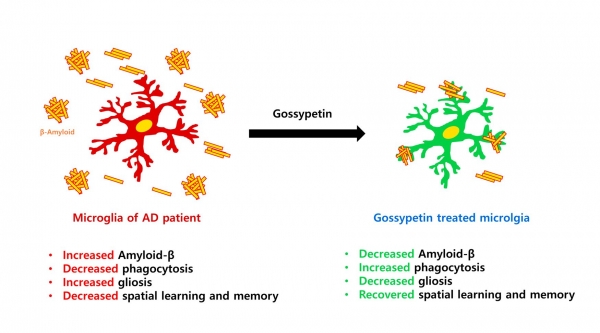
Red hibiscus tea is known not only to warm up the body but also to be effective in improving immunity. What if this hibiscus could defeat a disease without a cure, such as Alzheimer's disease (AD)?
Professor Kyong-Tai Kim and Ph.D. candidate Kyung Won Jo of the Department of Life Sciences (LIFE) have revealed that "Gossypetin", a substance containing hibiscus, activates microglia, a brain immune cell. It was also found that these immune cells diminish amyloid-β and restore the cognitive function of AD patients.
AD begins when toxic proteins such as amyloid-β and Tau accumulate in brain cells. Microglial cells eat up these protein aggregates and play an important role in protecting the brain. If the number of protein aggregates increases beyond the amount that microglia cells can handle, a chronic inflammatory reaction occurs, and nerve cells are damaged. A gradual decrease in the patient's memory and cognitive function follows.
Minimizing side effects is one of the biggest obstacles to the development of AD treatments. The research team noted the natural substance "Flavonoid compound" can reduce side effects. It is a secondary metabolite of plants or fungi that has a beneficial effect on the human body due to its anti-allergies, anti-inflammatory, anti-cancer, antioxidant effects, and low toxicity. In particular, the team researched Gossypetin which is contained in a plant called Hibiscus sabdariffa.
Following the oral administration of this compound for three months in mice with AD, memory and cognitive function were found to be restored to the same level as in the normal mice. Not only did the various types of amyloid-β aggregates commonly found in brain tissue in patients with AD decrease, but also the chronic inflammatory response decreased. Furthermore, microglial cells can diminish amyloid-β faster due to the influence of Gossypetin.
Prof. Kim explained, "Gossypetin, which can be extracted from Hibiscus, will be a safe and inexpensive treatment for patients suffering from AD in the future."
The study, recently published in Alzheimer's Research & Therapy, was conducted through joint research and support with NOVMETAPHARMA Co., Ltd. Through this study, researchers are planning a clinical trial to develop AD prevention and treatment.


